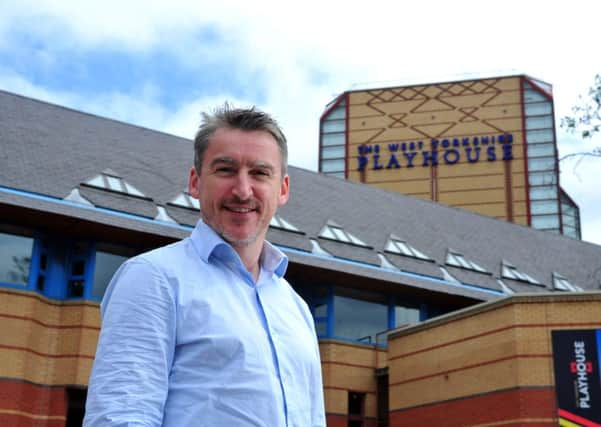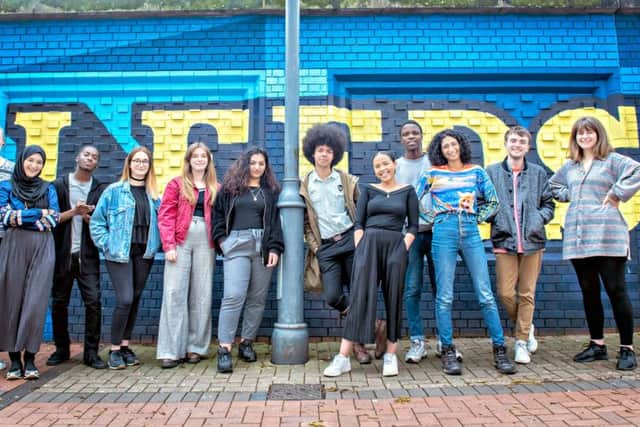James Brining on the biggest overhaul in the history of the West Yorkshire Playhouse


When James Brining was deciding on a fitting final show before the West Yorkshire Playhouse undergoes the biggest redevelopment in its 28 year history, he knew there were some obvious contenders. A new production of Leeds’ own Alan Bennett’s The History Boys would have guaranteed bums on seats. So too would another stage version of a Brontë classic and then there plays by those other Yorkshire stalwarts like JB Priestley and John Godber.
So when the artistic director announced that the last major production would be Sunshine on Leith, the musical based around the music of the The Proclaimers, he knew that there would be some who thought it was a bit too, well, Scottish, and certainly not quite Yorkshire enough. Brining though is unrepentant.
Advertisement
Hide AdAdvertisement
Hide Ad“I wanted something uplifting,” he says of the show, which has just opened for a four week run. “We are embarking on a really exciting chapter and I wanted to give our audiences a great time, something which felt like a celebration. When we did Annie and Strictly Ballroom in the Quarry the atmosphere was incredible and I am sure it will be the same with this show.


“I originally did Sunshine on Leith when I was in Dundee, but it has changed a lot since that production. I had been thinking of revisiting it and now just felt like the perfect time. Yes, we could have gone for something obviously Yorkshire, but if ever there was a right time to put on a show which isn’t parochial and which unashamedly says we are the United Kingdom then it is now.
That original stage show was later adapted into the film of the same name and while songs like I’m Gonna Be (500 Miles) and Letter from America, provide the soundtrack, it’s not The Proclaimers Musical. At the heart of the story are servicemen Davy and Ally who have to find their way in their hometown of Edinburgh after returning from serving overseas. It’s a show about love, about change and about the meaning of home.
“All those themes feel particularly relevant to us at the theatre right now,” says Leeds-born Brining, who has now been in post six years. “The music is the icing on the cake. Like a lot of people I knew The Proclaimers’ most popular songs, but when we started delving into their back catalogue, no one more than me was surprised at just how rich their music it is.
Advertisement
Hide AdAdvertisement
Hide Ad“These a two guys who are rooted in the folk tradition and because of that they don’t just do great tunes, they also do great narrative. Each and every song tells a story and that’s a gift when you are doing a show like this. Their music is the heartbeat to this production.”


It was not long after Brining arrived back in Leeds that he began talking of a redevelopment and the £14m makeover ticks most of those early wishes.
“I remember this place opening in 1990 and so when I ended up coming back here as artistic director I was in no doubt that there were big footsteps that I was following, but I also saw there was potential to expand and change,” he says. “Leeds is a big city with a thriving creative scene, but we are its only producing theatre. I wish there were more because I always think competition is healthy, but there aren’t. However, because of that I think it’s really important that we establish a studio theatre within the Playhouse.
“I have always said that a theatre like this has to nurture and encourage new writing that is by and of the people of Leeds. I hope that we have done that, but if we are going to do it properly we need a studio. You can’t put a work-in-progress on in the Quarry and even the Courtyard is a pretty big space. You need somewhere new writers feel comfortable working in.”
Advertisement
Hide AdAdvertisement
Hide AdWhile the addition of the studio is a key part of the scheme, from the public perspective it will be the reorientation of the whole building which Brining believes will have the biggest impact. Currently the main entrance to theatre faces onto the car park and the looming Quarry Hill government building. Under the new plans, visitors will enter from street level, opposite the new John Lewis and Victoria Gate development.
“Now it seems like a bit of an odd design, but there were good reasons for the original blueprint,” says Brining. “There were ambitions for the surrounding area to become a bit of a cultural hub. It never really happened and as a result the theatre always seems as if it’s turning its back on the rest of the city. When we reopen, we will be facing the city head on and I think that’s really important.
“The people of Leeds should feel that this theatre belongs to them and I hope that by giving the Playhouse a better, more visible public face it will encourage more people to come through our doors. I have always had a confidence that if we can get people over the threshold then they will want to stay, but the design of the building really hasn’t helped us. If I’m honest it’s been a bit of a barrier.”
Pop in to the current Playhouse cafe and on any given day you’ll find a succession of community groups sharing the space with audience goers and whichever cast is currently in rehearsal. Brining hopes that the new plans will encourage more of that, which is why he has taken the decision not to close the theatre completely during the 12 month build.
Advertisement
Hide AdAdvertisement
Hide Ad“In many ways that would have been the easier option,” he adds. “However, you also run the risk of being forgotten. I wanted to find some way of saying to people we are not going away, we are just going to do things a little differently for a while.”
The answer will be to turn one of the existing rehearsal spaces into a temporary venue. Seating will be limited, there will be little frills and fuss, but Brining says the enforced back to basics nature of the space will be its main advantage.
“It will allow us to take risks and put on the kind of work that we wouldn’t ordinarily do,” he says.
Had things turned out differently the new look Playhouse might well have opened its doors to see Leeds named European Capital of Culture for 2023. The rug was pulled on that particular project in the same week the city, along with five others, was due to submit its bid. With Britain leaving the EU, the year-long celebration of the arts will now go elsewhere, but Brining remains optimistic that some good can still come of the hard work.
Advertisement
Hide AdAdvertisement
Hide Ad“It was more than a little disappointing,” he says. “Everyone involved was gutted because I think we all thought that Leeds had a pretty persuasive bid. However, I have always maintained the journey towards the bid was just as important as winning the thing and I stand by that.
“Often arts organisations exist in a bubble and it is easy to become inward looking. This forced us to come together. The Playhouse should be reaching out to the city’s other theatres, the dance companies and the galleries. It’s what we are good at and when we reopen in 2019 we will pick up exactly where we have left off.”